Politics
Sri Lanka’s century of humiliation

by Mangala Samaraweera
“Reflect continually on the fact that all things as happen now, also happened before, and on the fact that they will happen again. The whole dramas and the comparable scenes…from history of the past….All these were similar only the actors were different.”
Marcus Aurelius
The Sunday Times of June 27 says that the Central Bank of Sri Lanka has taken the unprecedented step of issuing a commemorative coin celebrating the centenary of the Communist Party of China. This news followed ‘hot’ on the heels of the Colombo Port City bill which the government tried to rush through Parliament until the Supreme Court shot down a few of the clauses which could have violated our sovereignty and posed a serious threat to our country’s independence in the years to come.
Adding to the paranoia of many Lankans was the shocking exposé by ’Sirasa’, one of the leading broadcasters in Sri Lanka and perhaps the only truly independent TV station in this country today. I say this despite my being at the receiving end of its criticisms during the various periods I served as a Cabinet Minister, during the last three decades. This tv report showed Chinese personnel in Chinese Military uniform dredging a historic lake in the deep south (where youth unemployment is at its highest) under the patronage of a senior cabinet Minister of the ruling family.
These are a few examples which makes one wonder whether the principle of “extraterritoriality” is being applied liberally in our statecraft today. Is what we see the continuation of diplomatic relations with a friendly country or a major infringement of Sri Lankan sovereignty? Will historians of the future call this point in time as the beginning of Sri Lanka’s century of humiliation?
China is one of world’s greatest and most ancient countries; more a civilization than a country! The “Celestial dynasties” which ruled for millennia sincerely believed that they were the heavenly representatives sent to rule a vast kingdom – HONGUO/the middle kingdom, refined and civilized in a world of barbarians. The Emperor was perceived as mankind’s supreme sovereign, often referred to as the “Emperor of humanity” and his diplomats were called “Heavenly Envoys from the Celestial Court.
As Honguo was considered the centre of the universe, all interactions with the ‘barbarians’ of the outside world were controlled and limited; learning/translating the languages of the barbarians were banned without special permission, entering and traveling within the kingdom was also not allowed and only the Port of Guangzhou (Canton) was open to foreigners to conduct their trade. Even the envoy from the Queen-Empress Victoria had to hang around the port for weeks until it was decided to grant an audience with the Emperor in Beijing on the basis that the English diplomat will ‘kowtow’(to prostrate oneself and to touch the ground with ones forehead thrice) before the Emperor when received in the Royal court.
With the advent of high imperialism in the 17th century, western powers tried repeatedly to penetrate this vast kingdom for trade/commercial purposes but China remained one of the few Asian countries which could not be colonized by the British to become a part of the Empire where the ‘sun never sets.’
The East India Company was founded in 1600 with the objective of promoting trade and commerce in the Indian Ocean and China. By 1800, the company accounted for more than half the world’s trading and laid the groundwork for the British Empire and the Indian Raj; East India company rule was established in large parts of India in 1757 exercising military power and even assuming local administrative functions until 1858 when the British crown assumed direct control of India – ‘the jewel in the Crown’ where opium was grown to be sold to the ‘natives’ in all corners of the Empire.
In 1839, the opium war started against China in the face of determined and stiff resistance by the Qing dynasty to open up its vast market to British opium traders. Consequently, the British ordered the blockade of principal ports in China and were poised to attack the ancient capital of Nanjing, when the Chinese sued for peace. The treaty of Nanjing of 1842 imposed on China the cession of Hong Kong to the British, a payment of $6 million in indemnity, and the opening of five ports in which trade would be allowed and westerners would be permitted to reside.
Although China was not formally colonized, the treaty of Nanjing made it a de facto colony of the British Empire and the Qing court lost much of its independence in commercial and foreign policy. The principle of extraterritoriality enshrined in this treaty was to become a major infringement of Chinese sovereignty and the opium traders residing in the treaty ports would only be subject to their own countries’ laws and not that of China.
Thus began, what is known in China today as its “century of humiliation.”
Nearly two hundred years later, as the first quarter of the 21st century is drawing to a close, China is now poised to become one of the world’s
Sri Lanka’s…
leading economies with ambitions of becoming a military super power as well. Like the East India Company in earlier centuries, the investment, trading and commercial arm of China is now the Belt and Road Initiative. (BRI) started in 2013 and incorporated into the constitution of China in 2017. According to the BRI, the initiative is “a bid to enhance regional connectivity and embrace a bright future.”
In fact we know that the East India Company colonized the better part of the world with similar noble objective of civilizing ‘savages’ and natives promising all a ‘brighter future’. The imperial powers of the west carved out a very bright future for themselves and their countries over the last five hundred years but at what cost to the countries and the peoples they colonized? Isn’t the BRI the same old concept wrapped up in brand new gift paper?
What was challenged in the Supreme Court recently – the Colombo Port City Act, could well end up being a modern day Trojan horse or a Nanjing Treaty for Sri Lankans in the years ahead. The port city without any checks and balances and parliamentary oversight will create a city which is more or less a law unto itself; it will be a center for international money laundering for the local and international mafia. The likelihood of this piece of extraterritorial real estate turning into a center for international espionage for the super powers to protect/ subjugate the peace and stability of the Indian Ocean should also not be dismissed as mere fantasy.
Sri Lanka needs FDIs and trade opportunities desperately. Having an International Financial Centre on reclaimed land is a very good idea if it’s based on international law and participation, not merely serving the interests of a single country or two. In fact the first proposal for such a venture came from one of our very own Sri Lankan conglomerates in 2000. However, such proposals need not come at the cost of our sovereignty; it cannot be at the cost of our friends who provide 60% of our trade; it cannot be at the cost of diminishing our friendship with our friend and neighbor, India, 20 odd kilometres away. Sri Lanka has not been blessed with oil, diamonds, gold or copper; we have been blessed with a beautiful island and a most propitious geographical location on one of the busiest shipping routes in the world.
Therefore it is also in our greater interest to work with all countries to ensure that the Indian Ocean remains a zone of peace and stability while taking the maximum advantage of our position to create wealth and prosperity for our next generations. In the great power play between superpowers, Sri Lanka cannot afford to be a pawn of one group or another like Cuba in the early 1960s when not ideological but financial considerations compelled the Cuban government to allow USSR to install nuclear missiles 65km from the USA nearly triggering off a nuclear war in the Bay of Pigs.
Sri Lanka cannot afford to follow a confrontational and isolationist policy with the international community. Especially in this age of pandemics and international trade, multilateralism is the way forward. Westphalian concept of sovereignty is no longer valid and we must abide by our international obligations for the betterment of our own people. Sri Lanka must revert to the foreign policy almost all governments have followed since independence; despite our relative “insignificance” in the International order, Sri Lanka was a much loved and esteemed member of the international commmunity; from Washington to Beijing, from New Delhi to the Kremlin, from Downing Street to Tokyo, from Brussels to Ghana our leaders were welcomed with open arms.
Alas, no more!
Today, like somnambulists walking towards the precipice while tumbling over one humiliation after another, we are pushing our sons and daughters, towards a future of unimaginable horrors.
Stop. Think. Take stock.
Democracy and freedom, Justice and the rule of law, unity in diversity, multilateralism and international cooperation is the only way forward.
02.07.2021
Features
The Government’s Term Tests & Results: The Good, the Bad and the Ugly
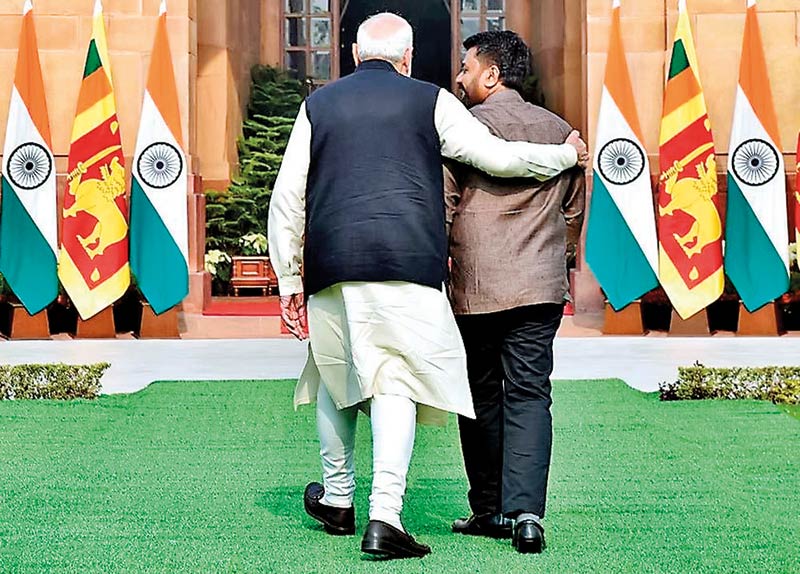
by Rajan Philips
A newspaper editorial suggested that the NPP government is facing its December term test and that its weaknesses are showing. In fact, there have been quite a few term tests set up by different pundit examiners and they are producing a mixed bag of results. Overall and objectively, if I may say so, the government has done a reasonably good job for the most part; with a few bads, mainly gaffes, including a Prime Ministerial gaffe involving the two ‘Chinas’; and one standout ugly – the pathetic “PhD in Biochemistry and BSc in Chemical Engineering” lies of Asoka Ranwala MP, and his deservedly quick fall from Speakership grace. The focus has been mostly on his PhD boast, but his claim to a degree in Chemical Engineering is itself an instant hoax. And the leap from Chemical Engineering in Moratuwa to Biochemistry in Japan is manifestly ignorant and creatively stupid.
The real tests have been on the government’s many critics including almost all media outlets – all of them outside parliament as there is no worthwhile opposition within parliament, and all of them wanting to rip a feather off the fledgling AKD presidency and NPP government. The Speaker fiasco has been the critics’ biggest reward so far but even they know that Mr. Ranwala’s stupid twin boasts are a damning indictment of the man’s character but not a fatal flaw of the government. There is no excuse for what this quack of an MP did but there is a limit to which the government can take the blame for it.
There is no question that the NPP government is being asked by numerous critics to show either results or its abilities to produce them almost instantly. Quite a rigorous treatment for a new government and so early in its term. A few of the critics have still not been able to come to terms with the reality that Sri Lanka now has a new JVP (NPP) government. Others are in it for the ride, and also because many of them do not have the same cordial access to the inner circles of the present government as they would have had to its (Ranil-Rajapaksa) predecessors.
All that said, the government with so many new MPs and Ministers is still on a long learning curve, and there are miles to go before it has its real ‘term test’ – the next general election, which one would hope will only be a parliamentary election without another presidential election. And miles to go in many directions involving different ministries and new initiatives.
This Sunday, it will be 90 days since the presidential election and 37 days after the parliamentary election. At the year end, President Dissanayake will be completing his first one hundred days in office, while his full government would have been in office for 47 days. So far, it is the President who has been the centre of all actions and attention. If the government is serious about transitioning to a parliamentary democracy, other cabinet ministers must and must be encouraged to step up and take responsibility for their portfolios in a very public manner as it used to be before 1977 and even until 1994.
People’s Pre-occupations
While President AKD’s first hundred days may not have been spectacular, they have been solid. He could be proud of his tone setting inaugural speech to parliament, his leadership in providing continuity on economic matters, the setting up of a compact cabinet, and the deft handling of his first official visit to India, the island’s preponderant neighbour. While these are commendable accomplishments, the people’s preoccupations are about the availability of essential goods and the affordability of their prices. The government has not found its stride on either front.
Rice and coconuts, among other essentials, have become thorny issues both in terms of rising prices and growing shortages. Fuel and electricity costs are added concerns, though there have been reductions in fuel prices. People and even critics are willing to give the new government some slack, but because so much was promised by the NPP during the election campaigns that order and fairness will be restored in the supply and sale of essential goods and services, the general public and critics have been expecting to see at least different approaches to these problems by the new government even if there are no immediate results arising from them.
Rice, Sri Lanka’s perennial political problem, is now the NPP government’s primary problem. There are both shortages and the uncertainty of prices, which will have to be addressed promptly to avoid facing the fury of the people. The usual quick fixes like price control and supplementary imports are creating more confusion than resolution. The paradox of high levels of rice consumption and the relative poverty of the farmers who produce rice is a longstanding structural problem. But if NPP were to be worth its salt it needs to get cracking on some of these structural problems.
The most notorious of them and where immediate action is needed is the stranglehold that of about six large rice millers have on the rice market. They virtually control the upstream purchase of paddy in large quantities, provide for intermediate processing and storage in massive capacities, and similarly control the downstream sale of rice to wholesalers and retailers in the distribution market. In addition, the rice millers who have benefited hugely from bank credit facilities to build up their milling industry have now become the primary lenders for the poor farmers and producers of paddy. They have taken advantage of the lack of regulatory oversight under successive governments and now become out of control monsters.
In their 2022 research paper on Rice Milling Economics and Market Power, WAN Wijesooriya and IV Kuruppu, two Agrarian Researchers, recommend government initiatives for establishing a comprehensive database covering the rice milling industry in the country, and for encouraging the growth of medium scale millers to break the stranglehold of the largest rice mill holdings. If the NPP government wants to succeed where previous governments have not only failed but did not even try, it must make use of the agrarian expertise available in the country and spearhead a systematic approach to break the stranglehold of the large rice millers. Anything less will be fruitless tinkering with a longstanding problem. The government must also encourage its subject Ministers to take the lead on these matters rather than channelling any and all files all the way to the President’s desk.
Indian Visit
I am not sure whether Sri Lanka’s current rice crisis came up for discussion during the President’s otherwise successful official visit to India. I do not recall if the word rice being in any of the reports or statements on the visit. Rice may not be the only missing word. There have been no references to 13A, or its plus or minus. For the first time, according to one wordy observer, the word ‘Tamil’ has been missing in all the public pronouncements of the visit. During his first meeting with a Sri Lankan President (Mahinda Rajapaksa) in 2014, Prime Minister Narendra Modi famously reset the bilateral clock to 13A. Perhaps 13A was a bone of contention when the Rajapaksas were at the helm.
Not anymore, it would seem, with a different President, a new government, its tone and messaging, and most of all the topsy turvy election results in the North and East of Sri Lanka. The NPP government could not have hoped for a better start with India on, for want of a less offensive word to some ears, the ‘Tamil’ file; but it has quite a bit of homework to keep it going the way it has started. The objective should be not to ‘disappear Tamil’ as a bilateral subject, but to accommodate Sri Lanka’s Tamils, Muslims and the Tamils of recent Indian origin as equal citizens in law and fact, in a not too distant post-racial Sri Lanka.
For all the historical ties and the geographical proximity between India and Sri Lanka, the relationship between the two countries in the twenty first century is both seen in and defined by the backdrop of China. President AKD’s visit was seen both as a test and as a signal as to which way he might be leaning considering the fact that his two predecessors have been wildly inclined to one side or the other.
Ranil Wickremesinghe, as former president, has been egging President AKD to go all in with India and follow the vision statement he co-announced with Modi in India without any reference to anyone back home. On the other hand, Mahinda Rajapaksa since becoming President in 2005 tilted Sri Lanka significantly towards China without unduly disturbing India. Which way will the wind be blowing with President AKD, has been the question on the minds of all observers of the little Indian Ocean drama involving Sri Lanka.
To his credit, President AKD flew straight and was sincere and honest in his interactions in New Delhi, and he could be expected to be similarly straight, sincere and honest when he goes to Beijing. Enough has been said about the range of topics for co-operation between India and Sri Lanka that was covered by the two leaders and articulated in their joint statement. The areas of co-operation between Sri Lanka and China may not be so extensive on paper but have been quite substantial on the ground.
The challenge to the NPP government, in my view, would be to take a comprehensive review of the plethora of projects in Sri Lanka that have been and are slated to be undertaken by the two Asian giants, make an assessment of their costs and benefits, and to have an integrated internal plan to ensure that the country would maximize the benefits of these projects, while minimizing environmental impacts and avoiding waste and duplication of resources.
Features
The burden of expectations
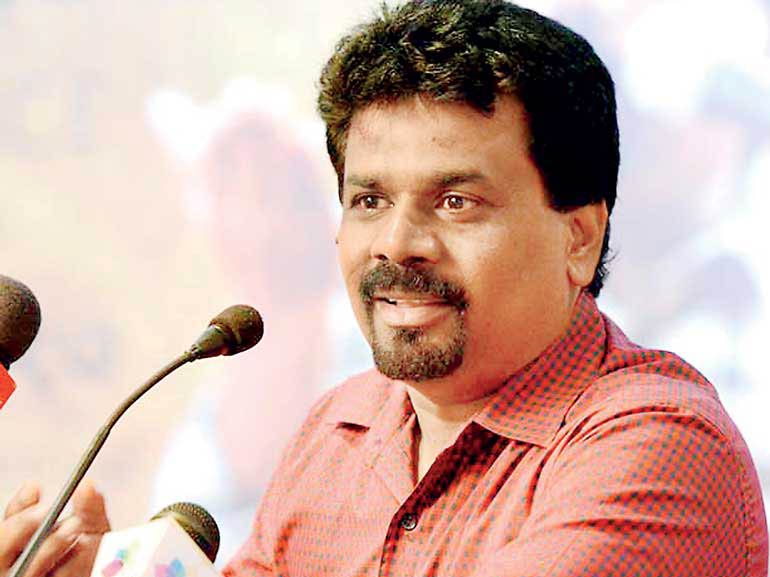
By Uditha Devapriya
 Compared to the excesses of the yahapalana or good governance regime, and the Gotabaya Rajapaksa raj that followed it, the omissions of this government seem trivial and innocent. The NPP is now two months in office, and whether we like it or not, the excitement of those early days is fading away. One can almost see the end of the honeymoon around the corner. The cynics are, of course, growing louder. They are all speaking with one voice – and in one tongue – and they are all saying that the government is doing precious little.
Compared to the excesses of the yahapalana or good governance regime, and the Gotabaya Rajapaksa raj that followed it, the omissions of this government seem trivial and innocent. The NPP is now two months in office, and whether we like it or not, the excitement of those early days is fading away. One can almost see the end of the honeymoon around the corner. The cynics are, of course, growing louder. They are all speaking with one voice – and in one tongue – and they are all saying that the government is doing precious little.
The Speaker of the Parliament must be beyond reproach. He must be like Caesar’s wife, and above suspicion. It does not do for someone constitutionally bound to integrity to lie about his credentials, as his critics allege him, and the government of which he is a part, as having done. Moreover, to me, the doctorate scandal highlights a bigger issue: the obsession that many Sri Lankans, in the public or private sector, have with their qualifications, and the mad rush among many of us to award ourselves honours we either do not have or do not deserve. In this, for better or worse, the Speaker is only too representative of many of his colleagues in parliament, and many of the people he is representing.
Yet once we account for the fact that the NPP/JVP has never been in power before – unless you count the parivasi (probationary) coalition of 2004 – once we acknowledge that the parliament is seeing a plurality of new faces for the first time since 1994, that the old faces have been wiped off from the face of the legislature and a new generation is in charge – once we get around adjusting ourselves to these realities, then we must realise that this too is an elected government, which, like its predecessors, needs to be kept in check.
Much of the criticism of the NPP’s actions, and inactions, come from those who have sinned for far too long to have any semblance of credibility. These are the Ranilists, the Rajapaksists, those who are glad the NPP is in power because that gives them the perfect opportunity to exact revenge on their rivals. The NPP, we must remember, has been in opposition for too long. They have, at every step of the way, pointed out the errors of those in government and the Opposition. When Harsha de Silva questioned the NPP’s ability to lead, Anura Kumara Dissanayake’s response was to band him and Ranil Wickremesinghe together, to liken them to birds of the same feather. Today, however, Dissanayake is President.
If the rise of the populist left hasn’t (yet) united the right, it appears to be doing so. True, the SJB and UNP – or the New Democratic Front (NDF) – don’t seem to be getting together. But some MPs, including certain bigwigs from the SJB, have hinted that they would be open to Ranil Wickremesinghe joining the SJB. These are, to be sure, minority voices. But they can well grow louder if the NPP fails. And the way things stand, the NPP can fail in two ways: it neglects its radical mandate and caves to the right, or it commits the same errors it accused other parties, both in government and Opposition, of doing.
On both counts, the NPP is playing with fire. It has opened itself to misinterpretation and critique, from both the left and right. A good example, perhaps the best one, is the IMF agreement. Now, it is not true that the NPP said at the outset, before it assumed power, that it would exit the IMF. That was never its promise, and to pretend otherwise would be disingenuous. Yet the NPP did give rise to expectations that it would at least talk to the IMF on a possible renegotiation of the terms.
President Dissanayake, to be sure, did stress on the importance of social protection during a meeting with the IMF delegation. Yet the situation has become so complicated that both Sajith Premadasa, the leader of the centre-right Opposition, and Ravi Karunanayake, the former Finance Minister who was at the heart of a financial scandal a decade ago, have questioned the NPP for continuing the reforms of the previous administration. “Don’t signal to the left, and then turn right,” Karunanayake recently advised the NPP.
In this, officials of the Wickremesinghe government have had it both ways – praising the NPP for continuing their reforms, while eviscerating them for their hypocrisy. The People’s Struggle Alliance (PSA) has emerged as the NPP’s critic on the Left, and it too has been vocal in its denunciations. Perhaps the biggest takeaway from all this is that no party can escape the allure of parliamentarianism. As a friend of mine put it, in Sri Lanka it is impossible to do politics without accounting for the vote. And as far as the NPP is concerned, even if they have not entered coalitions with other parties, they have come to power on the strength of the broadest electoral alliance in Sri Lanka’s post-independence history: an eclectic mixture of different, often divergent, class interests.
It is, of course, ironic for a party that called both the UNP and SLFP bourgeois formations in the 1970s – without appreciating the fundamental differences between the two – to cave into the same bourgeois democratic structures it sought to transcend. But this would be a gross misinterpretation of the NPP’s or rather JVP’s history. The JVP did make attempts to re-enter the democratic mainstream – prominently in 1982. But, for close to a decade in the 1980s and early 1990s, it toyed with the idea of going beyond that framework, provoked by the most right-wing authoritarian government Sri Lanka ever elected. Since 1994, it has been trying to course-correct and have it both ways – regain credibility among the masses without going down the route of coalitions and alliances with other formations.
None of this absolves the NPP. It is difficult to defend a government when it falls headlong into one scandal after another. The NPP’s leading faces have all grown silent. Perhaps they have no other choice – they have come to power on the most radical political agenda Sri Lanka has seen since 1970. Does that justify its recent failures, prominently the issue of the Speaker of Parliament? Probably not. As its critics and rivals get together to trip it at every corner, the NPP must realise that it cannot shield itself from censure for long. It must either respond to criticism – as it did, even if half-heartedly, with its statement on the PTA – or it must take decisive action – as it has so far failed to, with the Speaker. The NPP must realise it is no longer in Opposition. It must stop pretending that it is.
Uditha Devapriya is a regular commentator on history, art and culture, politics, and foreign policy who can be reached at udakdev1@gmail.com.
Features
The Silence of the Speaker and other matters
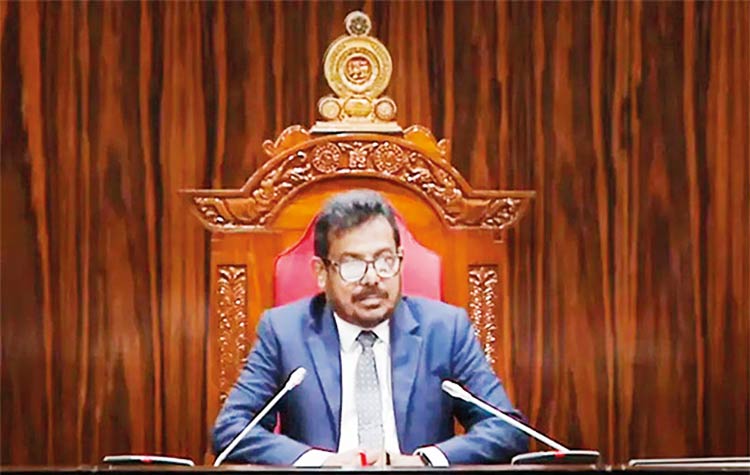
By Anura Gunasekera
It is more than two weeks since the matter of the Speaker, Asoka Ranwala’s doctorate, or lack of it, was raised in public. If he does have one, it is sufficient time for him to have produced the necessary evidence and laid to rest the ongoing speculation. When my daughter acquired a doctorate from a university in England, she was ceremoniously presented with an ornately inscribed scroll, on thick, parchment paper , along with a foolish hat.
To me, a non-academic, it seemed a paltry outcome for the several years of intense study which preceded the award but that, apparently, is how these systems work. Perhaps Waseda University of Japan, the institution alleged to have conferred the doctoral degree on Ranwala, does not emulate old-fashioned British institutions, but there still needs to be tangible, physical evidence of such an award, with which Ranwala came away from that institution.
Ignore the flippancy of the above paragraphs. The issue of the Speaker’s doctorate is a very serious matter. I understand that Ranwala has been using the prefix, “Dr”, for many years before his investiture as the Speaker of the 10th parliament of Sri Lanka. During the run-up to the recent presidential election, he has been introduced on stage as “Dr Ranwala”. Therefore, he deliberately made the world believe that he was a, “Dr.”
Recently there was some talk of Ranwala’s daughter offering an explanation but that is a ridiculous, unacceptable response. An explanation must come from Ranwala, personally, and not from a member of his family. It is a very simple matter, actually; either he has a doctorate or he has been deceiving the world for many years. In the case of the former he needs to furnish immediate proof to the public and if the latter is the reality, he must apologize for having been a public fraud and withdraw from governance.
To be the Speaker of the Parliament of Sri Lanka, a person must be compliant with the conditions of Articles 89 and 91, of the Constitution of the Republic of Sri Lanka. Neither of those articles specify that the Speaker should be literate, or that he should even be able to read, write and speak, in any known language. In fact, there are simply no minimum educational qualifications for those aspiring to represent the people of Sri Lanka in parliament, although there are clearly specified minimum educational qualifications for any person who applies for employment within the Parliament premises, even if it be the position of security guard, premises cleaner, or a minor employee, respectfully distributing glasses of water and cups of tea, to thirsty legislators within the chamber of representatives.
Then why is the issue of the Speaker’s qualifications of such importance?
When public figures, especially those occupying vital positions such as the Speaker of the Parliament, make a false claim about their educational qualifications, it undermines public trust in the political system. The NPP-JVP machine captured power in the last general election, largely on the promise of restoring principled governance to a corrupt country. I voted for candidate AKD at the presidential election in the fervent expectation of transparent governance. Thus, every elector who contributed to elevating the NPP to power, has the right to know whether Ranwala actually possesses the educational qualifications he claims, although those have no relevance to his current position in Parliament, or to the effective delivery of his responsibilities.
This matter is important because it highlights broader issues of accountability and transparency within governance. When public officials are permitted to misrepresent themselves, it points to a lack of scrutiny in the vetting of candidates for positions of power and influence. The fact that such claims go unchecked, also calls in to question the mechanism the party has in place, for ensuring ethical standards and honesty among its members.
Therefore, the quick and equitable resolution of this issue is crucial and central to entire ethos of the NPP regime, as the expectations of honourable conduct it has inspired within the public, is greater by an order of magnitude than that which was expected of any previous regime. It is also an issue which has been seized gleefully by an enfeebled Opposition, to discredit the government, and to move public focus away from the investigations into issues of corruption within earlier regimes, represented by many members now in the Opposition. The Ranwala affair is the first litmus test, of the present regime’s publicly declared ethos of doing only what is right. It needs to prove to the expectant polity that it means business, on every front.
Speaking of the Opposition, the ridiculous, just concluded (or is it?) charade regarding the appointment of individuals to the respective national lists of the Samagi Jana Balawegaya (SJB) and the New Democratic Front ( NDF), illustrates the incompetence, the indecisiveness and the lack of leadership ability of the two party chiefs concerned. It is relevant to remind the reader that these two, Ranil Wickremesinghe (RW) and Sajith Premadasa (SP), were highly vocal in the run-up to both the presidential and the general election, about the lack of governance experience within the NPP. It immediately begs the question, if one does not have the necessary control and influence within the party, to decide on a simple but important internal party issue like a nomination, how can one aspire to govern the country? In reality it is not just an internal party issue but one that concerns the entire national polity, as it is entitled, as of civic right, to see that all 225 seats in the legislature are filled.
Moving on to two equally pressing issues, the high price of coconuts and the non-availability of popular varieties of rice, both are embedded in histories which long precede the installation of the present government.
Coconuts have become progressively more expensive because of increasing consumption and declining production. According to the Sri Lanka Export Development Board (EDB), the annual production ranges from 2,800 mn nuts to 3,000 mn, whilst the combined domestic and export processing demand is around 4,000 mn nuts, annually.
The year-to-year variability of production is linked to climate variations, further compounded by a steady increase in coconut based products since 2012 (EDB). Coconut trees have an economically productive life-span and need to be replaced periodically. However, new planting has also declined drastically, with 2.28 million seedlings being issued in 2021, as against 9.73 million in 2012 and 6.81 million in 2013 (EDB). The 2021 crop had been very high (CRI) but the embargo on inorganic fertilizer imposed around that time by President Gotabaya Rajapaksa, has resulted in declining yields thereafter.
Wild animal depredation also has had a significant impact, suppressing yields and discouraging new planting, resulting in possible decline of production for the future as well. The industry assessment is that the 2024 production will reflect a 40% decline on the 2023 output. Around 33% of the total production is assigned for value added export products with the balance going in to domestic consumption. Thus, with the off-take by industries remaining constant, the volume available to the domestic sector has declined drastically. The grim reality is that unless the national industry is realigned, with viable, sustainable solutions for current problems, coconut prices will continue to rise periodically, well in to the foreseeable future. Solutions should also be able to strike a sensible balance between animal rights and farmer requirements. Animal rights activism, which takes place largely in affluent zones of residential Colombo- acted out by well-to-do urbanites of the city who have never had to defend a paddy harvest from a hungry elephant- has no relevance to the desperate realities of destroyed crops in Dehiattakandiya, Girandurukotte and Ethiliwewa.
The rice shortage, notwithstanding the obvious causes which have been ignored by successive governments in thrall to wealthy rice millers – again not attributable to the present regime – needs both a short-term and a long-term solution. Importing rice from India, as a knee-jerk response to the hunger of an angry nation, is not a sustainable solution but a one-time fix. It cannot happen again as the same scenario is played out the next year as well. The unalterable reality is that we are a rice eating nation and irrespective of the obstacles, that need must be appeased. “Let them eat cake”, whether Marie Antoinette said it or not, is not acceptable.
This regime has a two-thirds majority in Parliament and is headed by a president with supreme power. Should he, as an immediate solution, decide to take the most drastic steps in order to break the rice-millers’ stranglehold on rice stocks, a famished nation will applaud and the Opposition, if they understand what is good for them politically, will not dare raise a whisper in protest.
There are also the many questions which are being asked, regarding the status of pending investigations related to past corruption in high places. The difficulties in resurrecting dormant criminal investigations are understood; files are mislaid, papers vanish, evidence is lost, witnesses die, disappear or are terrorized in to silence, impartial investigators are neutralized and replaced with compliant stooges, cases by the dozen, against the high and mighty, are dismissed whilst authority is subverted. Previous regimes, especially those with the members of the Mahinda Rajapaksa “famiglia” in the right places, reduced these tactics to an exact science.
President AKD himself, in his speech at the recent Anti-Corruption Day, with brutal clarity, exposed the issues involved with reference to actual cases. In the audience were officials who, during previous regimes, may have been complicit in the very acts described in the previous paragraph. This nation, which catapulted the NPP-JVP to power as a last resort, will appreciate a commentary from the president himself, on all of the above issues. From time to time it needs to be assured that the regime is moving in the right direction, and the best person to put its collective mind at rest is the president himself.
-

 Sports5 days ago
Sports5 days agoPathirana set to sling his way into Kiwi hearts
-
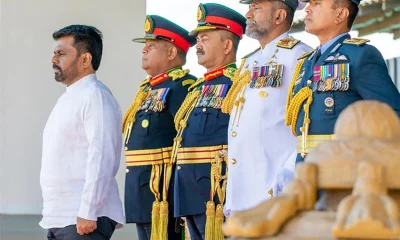
 News3 days ago
News3 days agoOffice of CDS likely to be scrapped; top defence changes on the cards
-
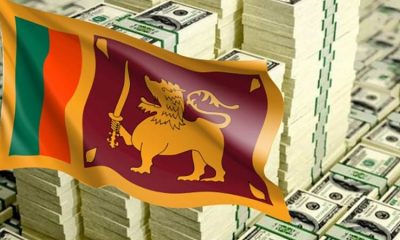
 News6 days ago
News6 days agoSL issues USD 10.4 bn macro-linked bonds
-

 Editorial6 days ago
Editorial6 days agoRanil’s advice
-

 Editorial5 days ago
Editorial5 days agoThe games they play
-
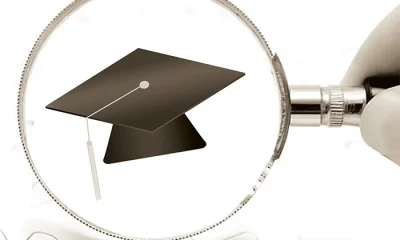
 Features3 days ago
Features3 days agoAn Absurd play in Parliament: Qualifications versus education
-
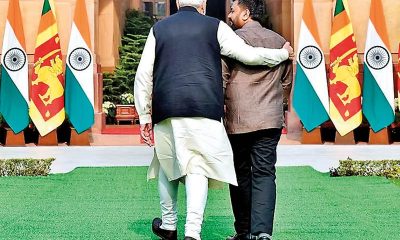
 Features5 days ago
Features5 days agoThe Government’s Term Tests & Results: The Good, the Bad and the Ugly
-
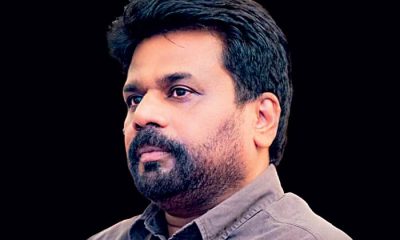
 Opinion4 days ago
Opinion4 days agoWhat AKD and NPP should bear in mind











